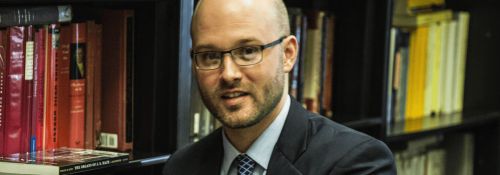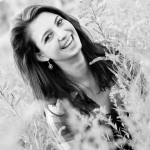
The Dynamic Balance Between Music and Liberal Arts
Written by Sarah Chavey
One step into his office and something immediately catches your eye. It’s the books; they not only attract attention by sheer quantity alone, but their color-coded organization adds character to the office that most others lack.
But Dr. Derek Stauff, the newest musicologist in the Hillsdale music department, brings with him more than just color-coded books. A graduate from Grove City College and Indiana University Graduate School, Dr. Stauff offers a plethora of knowledge in music history—specifically 17th century German music—and an energy to equal that of the current music professors.
“I always liked the idea that music combined both academic and musical skills. It combines many of the things you study at a liberal arts college. Language, history, history of ideas, aesthetics, art history—all that is relevant, and music ties in once you study it in enough detail. All of the skills you learn in those other disciplines are useful,” Dr. Stauff said.
He began his music career as a pianist in kindergarten, when his parents first signed him up for lessons. Though he recalls moments as a ten-year-old when he was uninterested in practice, his parents’ encouragement inspired him to continue.
In high school, he developed an interest in organ and began alternating weekly lessons between piano and organ. He finally decided to commit to organ while at Grove City, citing the influence of an incredible teacher who also encouraged him to apply for graduate school.
Stauff did not immediately choose a specialization upon entering graduate school but eventually discovered his love for music history, which he says helps supplement the entire understanding of music.
“I gradually got to the point that historical context could often explain stuff about music that looking at music in solely technical terms could not explain,” Dr. Stauff said. “Sometimes people treat music as above and outside history. They assume that certain features of music, like form or harmony, are timeless. A grounding in history can help show how most of what we hear in music is really the product of people long ago making choices. And many of these choices closely relate to larger trends in culture.”
He first imagined himself focusing on 20th century music but said, “I later decided 17th century was a lot more interesting. And I had always liked that repertoire, too. Like the 20th century, the 17th century was a major area of upheaval. There are some interesting parallels. Music in both centuries underwent major changes with new styles developing,” Dr. Stauff said.
He ultimately specialized in 17th century German music, writing his dissertation on Lutheran Music and Politics in Saxony during the Thirty Years’ War.
Now at Hillsdale, he’s teaching Understanding Music, Music History, and a class on Keyboard Music, emphasizing the work of J.S. Bach.
“He taught the same course as a graduate course at Indiana University,” Hillsdale senior Taylor Flowers said. “He actually told us it would be more difficult here than when he was teaching at Indiana because he’s assigning more research. I think he wants us to be familiar with methods of research that we might not be exposed to as much in the Hillsdale music program.”
Despite the challenge, both Taylor and senior Grace Hertz are enthusiastic about the newest faculty addition to the music department.
“He seems very hardworking and I think in turn, he expects his students to be very hardworking as well. He’s very aware of the body of scholarship in his field. He’s kind. I think he’s generous with his resources and his knowledge, and he seems to be very aware of the Hillsdale mindset and the work ethic of his students,” Taylor said.
Grace first met him while sitting in on a sample lecture that Dr. Stauff taught before he was hired.
“I had the impression that he had a lot of energy and that he was super knowledgeable. Having that dynamic balance, and being really excited about the older music that we’re learning about in music history—I think that’s still true,” Grace said.
Dr. Stauff first learned about Hillsdale while studying at Grove City, but became more familiar with the College when he met his wife Mariel, a Hillsdale graduate, at Indiana University. Now that he has arrived at Hillsdale, he is finally able to match the faces to the names he has heard so much about.
It was Mariel who originally encouraged him to apply to Hillsdale, telling him that he would fit in well with the environment. Other Hillsdale graduates who studied at IU also believed he would be a good fit, so Dr. Stauff was glad to take the position.
“I had gone to a similar liberal arts college and knew how the study of music complements and enriches a liberal arts education. I knew that students here would work hard and that many would be interested in the kinds of music I study,” Dr. Stauff said. “I am excited to help build the music department, especially with the new chapel in the works.”
 Sarah Chavey is a music major from Ann Arbor, Michigan. She hopes to pursue journalism when she graduates in 2017.
Sarah Chavey is a music major from Ann Arbor, Michigan. She hopes to pursue journalism when she graduates in 2017.